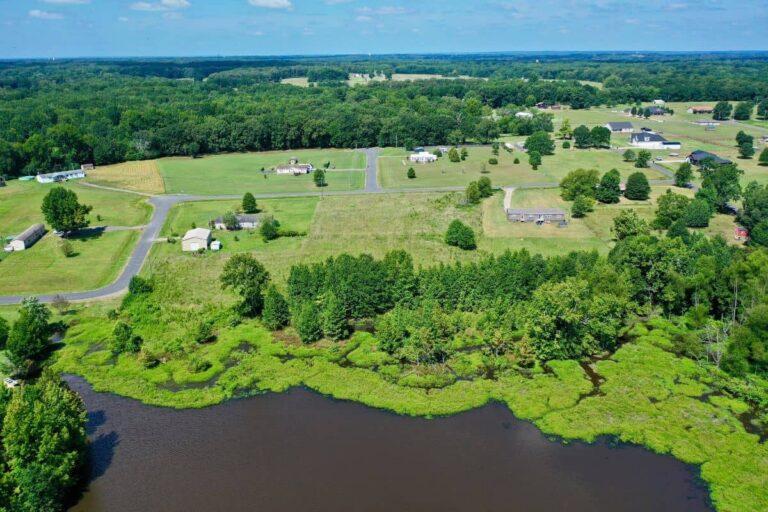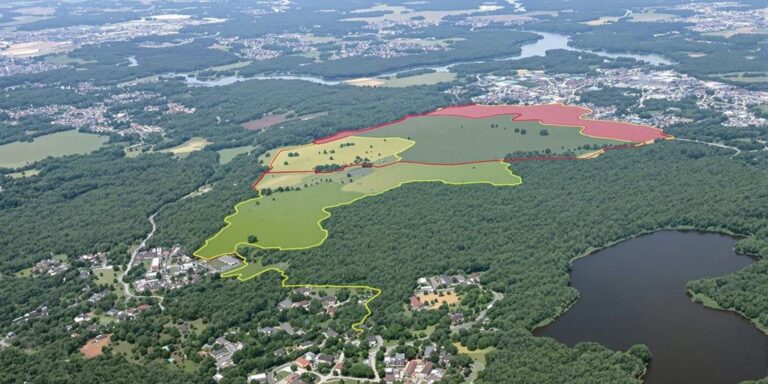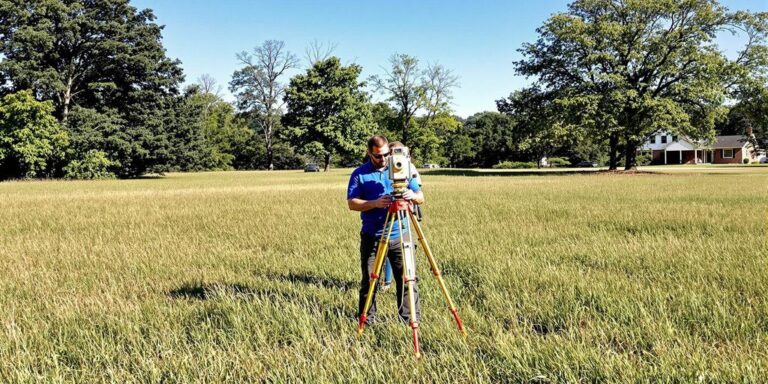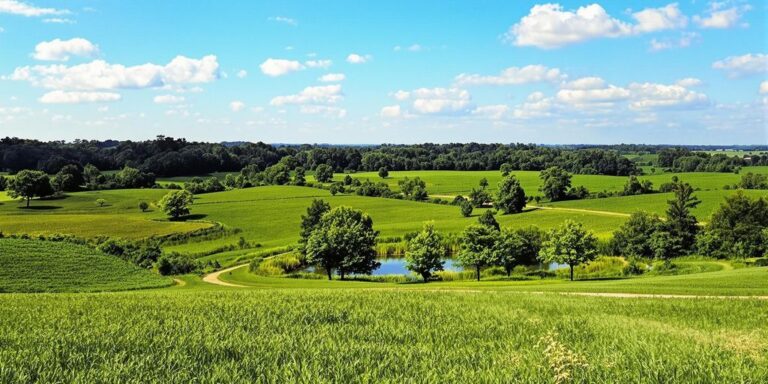If you own land in Arkansas or are thinking about buying some, it’s important to understand how to assess its development potential. This can help you make informed decisions about what to do with the property, whether that’s building a home, starting a farm, or simply investing. By looking at various factors like market trends, land characteristics, and local regulations, you can get a clearer picture of what your land might be worth and how you can maximize its value.
Key Takeaways
- Keep an eye on local economic trends to gauge land value.
- Urban areas typically have higher land prices than rural ones.
- Soil quality and access to water are crucial for agricultural land.
- Zoning laws can greatly influence what you can do with your land.
- Professional help can make a big difference in understanding land potential.
Evaluating Market Indicators

Understanding Local Economic Trends
To figure out what your land might be worth, you’ve got to look at the local economy. Is the area growing? Are jobs being created? A strong economy usually means more people want to live and work there, which can drive up land values. Check things like unemployment rates, new business starts, and overall economic growth in the county. This gives you a baseline understanding of the market.
Impact of Infrastructure Development
New roads, utilities, and other infrastructure can really change the game. If a new highway is planned near your land, or if water and sewer lines are being extended, that can make your property much more attractive to developers. Think about it: easier access and essential services make development way easier. Keep an eye on local government plans and announcements about infrastructure projects. It’s also worth checking if there are any new schools or hospitals planned, as these can also increase land value.
Demographic Shifts and Their Significance
Who is moving into (or out of) the area? Are there more young families, retirees, or something else? Demographics play a big role in what kind of development is likely to succeed. For example, a growing population of young families might mean demand for new housing and schools. A rise in retirees could mean demand for senior living facilities. Understanding these shifts helps you predict what kind of development will be most profitable. Here’s a quick example:
| Demographic | Potential Impact on Land Value |
|---|---|
| Increase in young families | Demand for single-family homes, schools, parks |
| Increase in retirees | Demand for senior housing, healthcare facilities |
| Increase in population density | Demand for multi-family housing, commercial spaces |
It’s important to remember that market indicators are just one piece of the puzzle. Zoning regulations, environmental factors, and financing options also play a big role in determining the development potential of your land. Don’t rely solely on market trends; consider all aspects before making any decisions.
Regional Variations in Land Value
Land values in Arkansas aren’t uniform; they shift depending on location, local economies, and development potential. Understanding these regional differences is key to making informed decisions about buying or selling land.
Comparing Urban and Rural Areas
Generally, land in urban areas commands higher prices than rural land. This is primarily due to increased demand for development, better infrastructure, and proximity to amenities. For example, land near Little Rock offers significant rural land value opportunities, Fayetteville, and Bentonville is often more expensive than land in more remote counties. However, rural land can still be valuable, especially if it’s suitable for agriculture or recreation.
Factors Influencing Local Markets
Several factors influence local land markets. These include:
- Zoning regulations that dictate what the land can be used for.
- Access to utilities like water, electricity, and sewage.
- Proximity to major transportation routes, such as highways and railways.
- Local economic conditions, including job growth and industry development.
It’s important to research local market conditions before making any decisions about buying or selling land. This includes looking at recent sales data, talking to local real estate agents, and understanding zoning regulations.
Identifying High-Growth Regions
Some regions in Arkansas are experiencing faster growth than others. These high-growth regions often present the best opportunities for land investment. Factors that contribute to high growth include:
- Expanding infrastructure, such as new roads and utilities.
- Economic zones and business development.
- Population growth and migration patterns.
- Proximity to major corporate hubs and universities.
Areas in Northwest Arkansas, like Bentonville and Rogers, have seen significant land value appreciation due to corporate growth and an influx of new residents. Keep an eye on these trends to identify potential investment opportunities.
Key Characteristics of Valuable Land

Soil Quality and Agricultural Potential
When it comes to land value, what’s under the surface matters a lot. Soil quality is a huge factor, especially if you’re thinking about farming. Good soil means better crop yields, which translates to higher profits. Land with fertile soil is always in demand. Consider these points:
- Soil composition: Is it sandy, loamy, or clay-rich?
- Drainage: Does water drain well, or does it pool?
- Nutrient levels: Are essential nutrients present?
Soil testing is a must. It gives you a clear picture of what you’re working with and helps you understand the land’s true potential. It’s an investment that pays off.
Access to Water Resources
Water is life, and that’s true for land too. Access to water can significantly increase its value. Think about it: you need water for irrigation, livestock, and even residential use. If you’ve got a reliable water source, you’re in good shape. Here’s what to consider:
- Proximity to rivers or lakes
- Well water availability and quality
- Water rights and regulations
Proximity to Major Transportation Routes
Location, location, location! It’s not just about being in a nice area; it’s also about how easy it is to get around. Land that’s close to major highways or transportation routes is generally more valuable. This is because it makes it easier to transport goods, access markets, and commute to work. Good transportation access opens up a lot of possibilities.
- Distance to highways and interstates
- Access to railways or airports
- Road frontage and accessibility
Assessing Zoning and Land Use Regulations
Alright, so you’re eyeing that plot of land in Arkansas and dreaming of what it could become. Before you get too carried away with visions of subdivisions or sprawling farms, it’s super important to pump the brakes and figure out what you’re actually allowed to do with the property. Zoning and land use regulations? Yeah, they’re not exactly the most thrilling topic, but trust me, understanding them can save you a ton of headaches (and money) down the road.
Understanding Zoning Laws
Zoning laws are basically the rulebook for how land can be used in a specific area. Cities and counties create these laws to control development and make sure things are organized in a way that makes sense. You might find areas zoned for residential, commercial, industrial, or agricultural use – and sometimes even more specific categories within those. It’s important to know what zone your land falls into. You can usually find this information at your local county clerk’s office or on the city’s website. Don’t skip this step!
Permitted Uses and Restrictions
Okay, so you know your zoning. Now what? Well, each zoning designation comes with a list of permitted uses. This tells you exactly what you can build or operate on the land. For example, if your land is zoned residential, you can probably build a house. But what kind of house? Single-family? Multi-family? Are there restrictions on the size or height of the building? These are the kinds of questions you need to answer. Also, be aware of restrictions. These could include things like setback requirements (how far a building must be from the property line), height restrictions, or even rules about landscaping. It’s all in the details. For example, you can check the zoning maps for Mayflower to get a better idea.
Impact of Zoning on Development Potential
Zoning can seriously make or break your development plans. Imagine you’re dreaming of building a shopping center, but your land is zoned for single-family homes. Bummer, right? That’s why understanding zoning is so important early in the process. If the current zoning doesn’t align with your vision, you might be able to apply for a rezoning, but that’s not always a slam dunk. It can be a lengthy and complicated process, and there’s no guarantee of success.
Ignoring zoning regulations can lead to costly delays, legal battles, or even the complete shutdown of your project. It’s always better to do your homework upfront and make sure your plans are in compliance with local laws.
Here’s a quick checklist to keep in mind:
- Identify the zoning designation of your land.
- Review the list of permitted uses for that zoning.
- Understand any restrictions or requirements that apply.
- Consider the impact of zoning on your development plans.
Financing Options for Land Development

Okay, so you’ve found the perfect piece of Arkansas land. Now comes the fun part: figuring out how to pay for it. Don’t worry, you’ve got options. It’s not always as straightforward as getting a mortgage for a house, but with a little research, you can find a solution that works for you.
Traditional Loans vs. Alternative Financing
Traditional loans are what most people think of first: going to a bank or credit union. They’ll look at your credit score, income, and the potential of the land. But, land loans can be trickier to get than home loans. Banks see them as riskier. Alternative financing includes things like owner financing (where the seller acts as the bank) or borrowing from private lenders. These can be easier to qualify for, but often come with higher interest rates or different terms. It’s all about weighing the pros and cons.
Understanding Owner Financing
Owner financing can be a real lifesaver, especially if you’re having trouble getting approved for a traditional loan. Basically, the seller finances the purchase for you. You make payments directly to them, according to an agreed-upon schedule. This can be more flexible than going through a bank, and the terms might be more negotiable. However, it’s super important to get everything in writing and have a lawyer look over the agreement. You want to make sure you’re protected. If you are a seller, to attract buyers, consider offering financing options.
Grants and Incentives for Development
Did you know there are grants and incentives out there to help with land development? It’s true! These programs are often offered by state or local governments to encourage certain types of development, like agricultural projects or renewable energy initiatives. Here’s a few things to keep in mind:
- Research is key: Look into state and federal programs. A good place to start is the Arkansas Economic Development Commission.
- Eligibility requirements: Each program has its own set of rules. Make sure you meet them before you apply.
- Application process: Be prepared to fill out paperwork and provide documentation. It can be a bit of a hassle, but the payoff can be worth it.
Don’t overlook grants and incentives. They can significantly reduce your upfront costs and make your project more financially viable. It’s worth spending the time to see what’s available in your area.
Environmental Considerations in Development
It’s easy to get caught up in the excitement of developing land, but you can’t forget about the environment. Ignoring these aspects can lead to big problems down the road, from costly delays to legal headaches. It’s about finding a balance between progress and preservation.
Assessing Flood Risks and Soil Quality
First things first, you need to understand the land’s vulnerabilities. Is it in a floodplain? What’s the soil like? These factors directly impact what you can build and how you build it. A detailed soil analysis will tell you about its composition, drainage, and stability. Flood maps from FEMA are a must-see to understand potential risks. Ignoring these things could mean your project literally washes away or sinks into the ground. You should also consider the environmental factors that could impact development.
Identifying Protected Areas and Wildlife
Next, you’ve got to figure out if there are any protected areas or endangered species on or near your property. This isn’t just about being a good neighbor to nature; it’s the law. Check with your local and state environmental agencies to see if there are any restrictions or requirements. You might need to conduct an environmental impact assessment to see how your project will affect the local ecosystem. Remember, disturbing protected habitats can lead to hefty fines and project shutdowns.
Mitigating Environmental Impact
Okay, so you’ve assessed the risks and identified potential problems. Now what? It’s time to think about how to minimize your project’s impact. This could involve:
- Implementing erosion control measures during construction.
- Creating buffer zones around sensitive areas.
- Using sustainable building materials.
- Developing a stormwater management plan.
Consider incorporating green infrastructure, like rain gardens or permeable pavements, to reduce runoff and improve water quality. These measures not only help the environment but can also increase the value and appeal of your development. It’s a win-win situation.
Professional Guidance in Land Assessment

It’s easy to feel lost when trying to figure out the development potential of land. Getting advice from people who know the area and the process can make a huge difference.
The Role of Real Estate Agents
Real estate agents do more than just sell houses. They can provide current area comparisons, assist in evaluating parcels based on their best-use potential, and aid in negotiations. They can help whether you’re trying to get the most money for your land or trying to get a fair price on a purchase. Agents who know the local land market can offer invaluable insights when you’re working on deals.
Importance of Land Surveys
Knowing exactly what you’re buying is pretty important. That’s where land surveys come in.
- Confirm property boundaries.
- Identify easements and rights-of-way.
- Reveal any encroachments.
Getting a professional land surveyor to assess the boundaries is a smart move. It can save you headaches later on.
Consulting with Local Experts
Local experts can be a game-changer. They understand the nuances of the area, things you might miss if you’re not from around there. They can help you understand local regulations, market trends, and potential challenges.
Working with local experts is not just about getting information; it’s about building relationships and gaining a deeper understanding of the community. This can be incredibly helpful when you’re trying to get your project approved or gain support from the locals.
Wrapping It Up
In the end, figuring out the development potential of your Arkansas land is a mix of research and gut feeling. You’ve got to look at the location, the local market, and what the land can actually do. Whether you’re thinking about selling or just holding onto it for now, knowing the ins and outs can really help you make smart choices. Keep an eye on the trends, talk to the pros, and don’t rush into anything. With the right approach, your land can be a solid investment, no matter what you decide to do with it.
Frequently Asked Questions
How does development potential affect land value?
Yes, it really does. Land near new roads, businesses, and growing towns is usually worth more than land that is far away from these places. Being close to these developments makes the land more valuable.
What features make farmland more valuable?
Farmland is worth more when it has good soil, proper drainage, and easy access to water. Also, being near highways or grain elevators helps because it makes transporting crops easier.
Is it hard to figure out the price of land in Arkansas?
Yes, it can be tough to find the exact price per acre because prices change all the time based on location and what the land can be used for. Looking at recent sales and getting help from a local agent can give you a good idea of what the land is worth.
What should I know about zoning laws?
Zoning laws tell you what you can and can’t do with the land. It’s important to understand these rules before buying land, as they can limit how you can develop or use the property.
What financing options are available for buying land?
You have a few choices for financing. You can get a regular loan from a bank, look into owner financing where the seller helps you pay, or check for grants and other financial help for development.
Why is it important to get professional help when buying land?
Getting help from real estate agents, surveyors, and local experts is important because they know the area well. They can help you find the right land, understand the rules, and make sure you get a fair deal.






